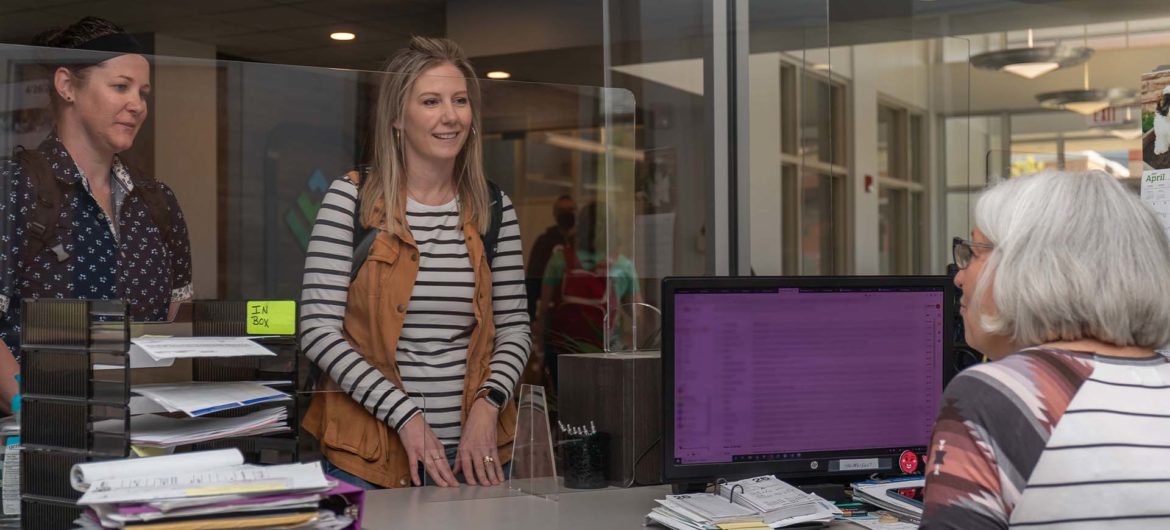MARIETTA, OHIO—Students at Washington State College of Ohio (WSCO) have been awarded more than $1.56 million in Federal assistance since the onset of the pandemic. Recognizing a greater need, the college has augmented the support to provide additional provisions to help students maintain their momentum to complete their degrees.
The three rounds of Higher Education Emergency Relief Fund (HEERF) money provided under the Coronavirus Aid, Relief, and Economic Security (Cares) Act, 2021 Coronavirus Response and Relief Supplemental Appropriations Act (CRRSA), and the American Rescue Plan allowed WSCO to provide students with two types of support said Director of Enrollment Services and Financial Aid Reba Bartrug. The first, identified by the college as the Community Impact Grant, was money allotted specifically for tuition assistance up to 15 credit hours as well as course fees. The college awarded over $876,000 of these funds to 428 students.
The second category was earmarked for emergency assistance. Bartrug explained that these funds were awarded to students to help with expenses beyond tuition such as transportation, technology access, and childcare. In total, the college awarded nearly $670,000 of these funds to 595 students.
Bartrug said she received hundreds of applications for the assistance with moving stories. One student wrote in his application, “We lost my father (to COVID) who was the biggest income in our household and now we struggle to pay the bills and put food on the table. I need help to pay for school and to help the family have food so we can eat daily instead of hoping we get food for the day.”
Another student said, “Due to COVID I had to cut down on my hours at work. I lost my child care and my insurance was affected. I have bills I cannot pay. I also had to defer my car payment for six months and I worry about losing my means of transportation. I’ve never been the type of person to ask for help. I always try to figure things out myself. I’ve been very stressed worrying about how I’m going to pay for everything I need in order for me to continue my education and get myself to where I always dreamed I (would) be.”
As students shared their stories of financial struggles, the college realized the need to do more to meet the needs of its students. As a result, Washington State committed a portion of its institutional federal HEERF allocation to provide additional student assistance. Bartrug said students who were impacted by Covid-19 and had past-due balances since the Spring 2020 semester could apply for this additional financial support. To date, the college has covered past due balances for 20 students totaling nearly $18,000.
In addition to the financial assistance through the Higher Education Emergency Relief Fund, Washington State also provides ongoing student support through the WSCO Foundation’s Student Emergency Fund and the WSCO Food Pantry Fund. Through the Student Emergency Fund, the Foundation has been able to provide gas cards, cover utility bills, assist with car repairs, and even help with rent. Even prior to the pandemic, 59 percent of WSCO students indicated that they ran out of money five or more times during the year. Other alarming statistics showed that half of WSCO students struggle to pay rent and/or utilities and nearly one-third were dealing with food insecurities. These students who were already financially strapped and worrying about their food reserves were being put under further strain during the pandemic. Thankfully, donors responded to the call for action and the Foundation was able to increase contributions by 60 percent in 2020 to support emergency funds, the WSCO Food Pantry, and tuition assistance.
“We have worked hard to remove barriers that keep students from earning their degrees,” Bartrug said. “The support we’ve been able to provide, from the Federal government, the college, as well as the donors through the Foundation, make it possible for students to continue their enrollment during these difficult times.”
In fact, WSCO saw an increase in the percentage of students who continued their enrollment from fall to spring semester in 2020 compared to 2019. While Bartrug said there is no definitive way to prove that the additional resources are the reasons these numbers have increased, she believes the evidence shows they are likely a significant contributor.
The college is now accepting applications for tuition assistance and emergency grant funding for the spring semester. Funds are limited and will be distributed on a first-come, first-served basis. Applications are available on the college website at wscc.edu/current/financial-aid/covid-resources/. If students wish to apply for assistance with overdue balances, those applications can be picked up from the Financial Aid office located in the Student OneStop or they can be requested via email at finaid@wscc.edu.





